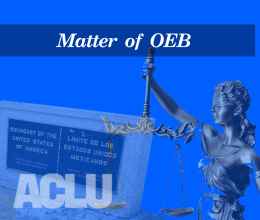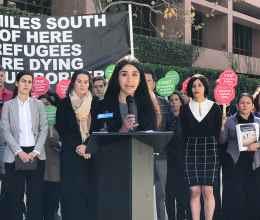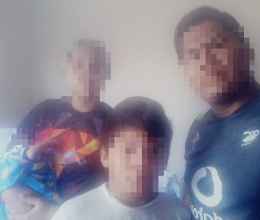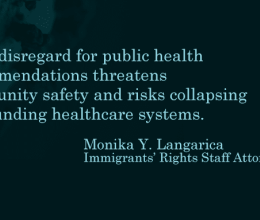SAN DIEGO – Today, the Ninth Circuit Court of Appeals issued an opinion siding with ACLU clients in a case involving the First Amendment right to protest and monitor law enforcement activities in public. After plaintiffs Peter Ragan and Leesa Jacobson encountered harassment and retaliation from Border Patrol agents while attempting to monitor a checkpoint in rural Arizona, the ACLU of Arizona, ACLU of San Diego & Imperial Counties, and Covington & Burling, LLC filed suit.
“This is a big win for First Amendment rights and border residents’ efforts to observe Border Patrol interior enforcement operations, including checkpoints,” said Mitra Ebadolahi, a staff attorney with the ACLU’s Border Litigation Project.
Ragan and Jacobson are members of People Helping People, the organization that launched a checkpoint monitoring campaign in Amado, Arizona, in February 2014. The campaign was initiated in response to residents’ growing concern about Border Patrol activities in their community, including prolonged interrogation and detention, racial profiling and verbal harassment by Border Patrol agents at a checkpoint on Arivaca Road.
In response to the community’s peaceful monitoring and observation efforts, the Border Patrol tried to block observers’ view of the checkpoint; threatened them; and parked vehicles in their proximity with engines idling for hours at a time, exposing them to noxious emission fumes.
“Our clients have been cordoned off far away from the checkpoint, had their view of the checkpoint blocked by Border Patrol vehicles, and been threatened with arrest,” said ACLU of Arizona Legal Director Kathy Brody. “Many Arivaca residents are forced to drive through this checkpoint every day and have to answer to armed federal agents. They have the right to monitor how these agents are behaving.”
Despite its official designation as a temporary operation, the Arivaca Road checkpoint has been in operation for over 10 years. It is one of four interior Border Patrol checkpoints within 30 miles of Arivaca. Many Arivaca residents must pass through the checkpoints daily to go to work, school, or to run basic errands.
The First Amendment protects individuals’ right to photograph, record and observe law enforcement officials engaged in the public discharge of their duties. This is a precious and fundamental right that distinguishes our society from a police state.
In an earlier ruling, the federal district court in Arizona sided with the Border Patrol. The ACLU appealed to the Ninth District Court and the panel reversed the earlier decision, sending the case back to trial court for further factual analysis.
###







